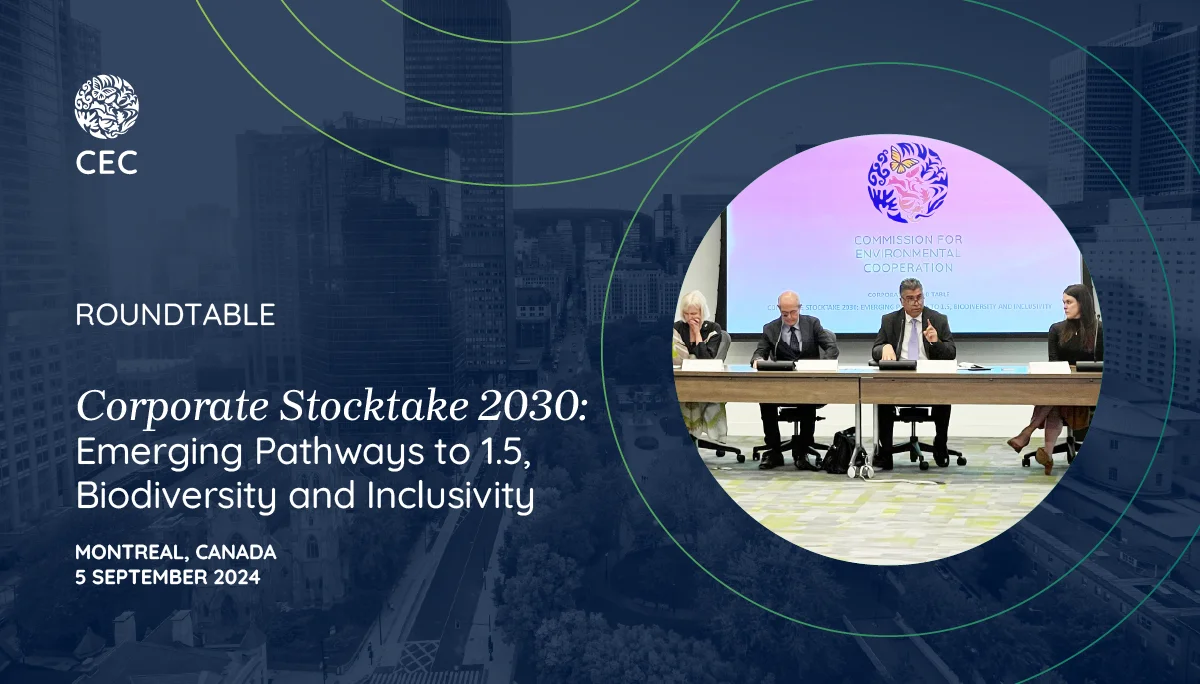Round Table Corporate Stocktake 2030: Emerging Pathways to 1.5, Biodiversity and Inclusivity
Montreal, QC
Canada
September 5, 2024
Private
This half-day in-person roundtable co-hosted in Montreal on 5 September 2024 by the Commission for Environmental Cooperation (CEC), the Secretariat of the Convention on Biological Diversity (CBD), and the Montreal Office of the International Sustainability Standards Board (ISSB), brought together private sector leaders from Canada, Mexico and the United States to discuss emerging trends for the private sector on climate change, biodiversity conservation, environmental justice, Indigenous engagement and inclusivity strategies in the run-up to the UNFCCC COP29 in Azerbaijan and CBD COP16 in Colombia.

Agenda
Time Zone: Atlantic Standard Time (AST)
The conclusions of last year’s Climate COP28 in Dubai and the Biodiversity COP15 in Montreal were extremely clear, the planet is not currently on a 1.5C pathway to 2030, and this will result in breaching imminent, irreversible, and deeply destructive climate tipping points, as well as cause irrecoverable loss of biodiversity. Time is short and 2030 is the new 2050. Governments are taking more aggressive, more effective and more accelerated actions, rolling out policy, legislation and regulations to tackle the triple planetary crisis of climate change, pollution and biodiversity loss, and are stepping up their call to the private sector to be more ambitious on climate targets, to step up reductions of the most potent GHG pollutants (such as methane, black carbon and HFCs), to expand climate and biodiversity disclosures, to sharpen risk assessments, and to consider avoided warming strategies, nature-based solutions and biodiversity conservation in business plans. In a quest to build community resilience to this crisis, they’re also calling on business to increase Indigenous engagement, to consider private sector impacts to environmental justice, and that companies ensure they are promoting equity and inclusion in their sustainability strategies.
Under the Chatham House Rule for free and open discussions, this roundtable will bring together key North American actors from Canada, Mexico and the United States to reassess where the private sector is on its climate and sustainability outlook, and where it’s heading as we approach UNFCCC COP29 in Azerbaijan and CBD COP16 in Colombia.
9:00 am-9:10 am
Welcome and Introduction of roundtable
Marcela Orozco, CEC Head of Unit, Advisory Groups and Private Sector Engagement
9:10 am-9:45 am
The Triple Planetary Crisis, the Year 2030 and the 1.5C Pathway
Jorge Daniel Taillant, CEC Executive Director
The CEC’s Executive Director offered reflections on the immediate short- and long-term implications of the escalating climate crisis and likely future trends on climate policies and actions. The presentation focused on how climate change scenarios and priorities are shifting, and how they will likely influence laws, regulations, rules, policy, disclosure, risk analysis, insurance and management responsibilities and other private sector measures.
9:45 am-9:55 am
Expanding Global Targets — Kunming-Montreal, Biodiversity and Private Sector Engagement
Neil Pratt, Officer in Charge of the CBD Implementation Support Division
Convention on Biological Diversity
Neil Pratt shared his views on global biodiversity conservation and restoration targets, including conserving 30% of the world’s biodiversity by the year 2030, what it means for the private sector, and where we can expect biodiversity conservation actions to emerge from the imminent COP16 meeting in Colombia. The discussion shed light on how companies can focus their actions to build climate resilience through nature conservation.
9:55 am-10:10 am
Mobilizing the Private Sector Toward Emerging Sustainability Priorities
Isabelle Mégré, Montreal Office Director
International Sustainability Standards Board (ISSB)
Isabelle Mégré turned the discussion to emerging trends in corporate disclosure and ESG strategies aimed at elevating corporate action on the triple planetary crisis. Her intervention centered on how the private sector will need to adapt to heightened sustainability priorities, discussing the policies, strategies and tools necessary to support the private sector’s evolving engagement on climate.
10:10 am-12:00 pm
Open Roundtable Discussion amongst Experts
Guiding questions
- What conclusions and what trends do you identify in current climate and biodiversity frameworks that affect your short-term outlook (to 2030) and beyond? What are key emerging trends that are affecting your company and/or your sector’s climate strategy and planning? What impact do you think the upcoming climate COP 29 and biodiversity COP16 will have on your strategy and planning?
- How is your company/sector aligning investments and operations with international environmental agreements and emerging climate change-related policy, regulation and requirements? What are the barriers that are hindering further action?
What are the key gaps in knowledge/know-how, tools and policies that must be addressed to enable your company/sector to incorporate new inclusive strategies, including on environmental justice and social equity, or emphasis on Indigenous engagement
12:00 pm-12:15 pm
Wrap-up and Identification of Future Agenda Topics for Follow-up Meetings
12:15 pm-12:30 pm
Closing remarks by David Cooper, Deputy Executive Secretary, Secretariat of the Convention on Biological Diversity
Contact
Marcela Orozco
Director, Advisory Groups and Public Participation
(514) 350-4305
Samantha Gagnon
Lead, Advisory Groups and Private Sector Engagement
(514) 350-4329